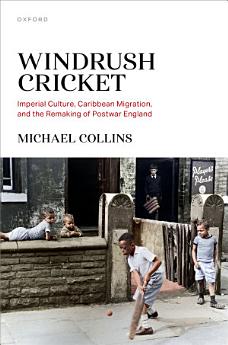Windrush Cricket: Imperial Culture, Caribbean Migration, and the Remaking of Postwar England
Michael Collins
Sep 2025 · Oxford University Press
Ebook
240
Pages
family_home
Eligible
info
reportRatings and reviews aren’t verified Learn More
About this ebook
How did the 'quintessentially English' game of cricket come to be so important across Britain's Caribbean empire? As empire declined and gave way to complex patterns of migration, what part did cricket play in the life of the Windrush generation in post-war Britain? Following the work of the great Trinidadian intellectual C. L. R. James, much has been written about the profound importance of cricket for the development of social and cultural life within the Anglophone Caribbean. And yet, from at least the 1930s, black West Indian cricketers were celebrated far beyond the Caribbean, in England and across empire. Cricket was in fact a major factor shaping imperial ideas about black people--how they looked and behaved, what their imagined characteristics and traits were--placing the West Indies, as the Caribbean islands were then known, within a racialised, hierarchical structure of cricket-loving peoples, alongside the colonies of white settlement: South Africa, New Zealand, Australia. During World War II, black West Indians played prominent roles in the surprisingly large amount of cricket played in England, part of a wider propaganda effort to promote the idea of a multiracial empire, united in common cause against fascism. For post-Windrush arrivals after 1948, cricket was not just a peripheral pastime or a recreational footnote. Cricket was a cornerstone of black West Indian social and cultural life and self-empowerment in England, integral to the earliest creation of social and community groups and the development of support networks. Watching the West Indies international cricket team win on the field of play was just one part of the Windrush story. Through the late 1940s and into the 1950s, the growth of an extensive network of Windrush cricket teams and clubs, and, by the 1970s, the evolution of Caribbean cricket leagues and competitions, created a subtle and multifaceted sense of being a West Indian in England. In due course, the children of Windrush migrants would seek to play cricket for England, challenging the very notion of what it means to be English. Interweaving extensive archival and oral history research into an engaging, often surprising narrative about empire and postwar Britain, Windrush Cricket challenges a range of orthodoxies, arguing that cricket constituted a foundational, yet almost entirely ignored aspect of the way in which Windrush migrants settled and made new lives in postwar England.
About the author
Dr Michael Collins is an associate professor of history at UCL. He was awarded his doctorate by the University of Oxford in 2009, after studying for degrees in political science at the London School of Economics and history at Cambridge University. He has published on the political thought of Rabindranath Tagore; on nationalism and decolonisation; on the rise and fall of federations in the British Empire; and on the significance of cricket in terms of imperial culture and post-imperial identity. He has been a permanent member of the UCL History staff since 2010. From 2021-2024 he was a commissioner on the Independent Commission for Equity in Cricket (ICEC).
Rate this ebook
Tell us what you think.
Reading information
Smartphones and tablets
Install the Google Play Books app for Android and iPad/iPhone. It syncs automatically with your account and allows you to read online or offline wherever you are.
Laptops and computers
You can listen to audiobooks purchased on Google Play using your computer's web browser.
eReaders and other devices
To read on e-ink devices like Kobo eReaders, you'll need to download a file and transfer it to your device. Follow the detailed Help Center instructions to transfer the files to supported eReaders.






